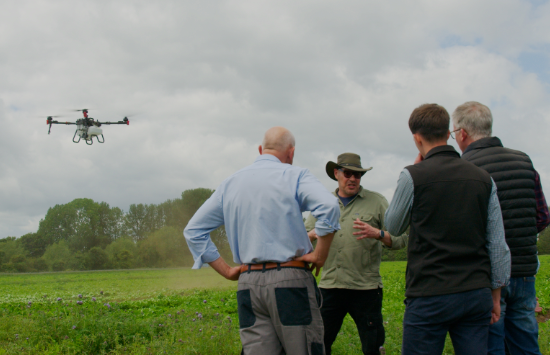M&S is to begin selling robot farmed, low carbon parsnips in some of its food stores from next month.
The move follows a trial by the retailer and its supplier Huntapac to use technology to create environmentally friendly products.
It says it is the first retailer to run, and sell products from, an “autonomous field” trial.
Technology used includes using two robots for bed forming, planning and weeding as well as two different types of drone to monitor and maintain the parsnip crop’s health.
In addition, technology is being used to test soil health and carbon impact.
Environmentally friendly fertiliser and cutting down on diesel used by tractors are other ways the trial is looking to ensure the product is meeting net zero commitments.
The robot method of farming is helping boost production too, claims the retailer and its supplier.
They said that in March, following a sustained period of rain, the robots were able to plant the field “which wouldn’t have been possible with a traditional tractor”.
“Not only are we seeing a reduction of the carbon impact but more parsnips at higher quality, due to us being able to plant the seeds despite bad weather earlier this year,” said Huntapac technical and sustainability director Stephen Shields.
“This would have a fantastic impact on our business at scale and we’re aiming to deliver multiple fields farmed this way for next season.”
The initiative forms part of the supermarket’s aim to be net zero across its operations by 2040. It has funded this low carbon food trial through its M&S Plan A Accelerator Fund, which has been created to meet its climate commitments.
“Much like when agriculture moved from horse and plough to mechanical tractors, these latest technologies offer a future of farming that will aid farmers, create more highly skilled jobs in the industry and attract new talent,” said M&S.
The retailer’s technical director Andrew Clappen added: “Projects like this help us move towards being a Net Zero business across all our operations and entire supply chain by 2040, whilst focussing on the quality of produce.
“Agriculture is one of our biggest contributors to emissions, so it’s important that we find new lower impact farming methods.”
Latest News
-
Premier League and Comic Relief partnership aims to improve children’s mental health
-
Russell Hobbs launches food poverty campaign in schools
-
Tottenham Hotspur and charities launch film to tackle mental health stigma
-
Cardfactory funds homelessness charity’s team of psychologists
-
Bingo firm raises £300,000 for the Stroke Association
-
Sainsbury’s links up with Comic Relief for festive recipe campaign
© 2019 Perspective Publishing Privacy & Cookies







Recent Stories